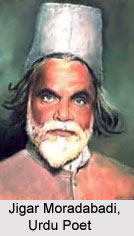 Jigar Moradabadi was the nom de plume of Ali Sikandar and was born in the year 1890. He was one of the most popular Urdu poets of 20th century and is renowned Ghazal writer in Urdu language. He was bestowed with the Sahitya Akademi Award in the year 1958 for his highly acclaimed poetry collection "Atish-i-Gul".
Jigar Moradabadi was the nom de plume of Ali Sikandar and was born in the year 1890. He was one of the most popular Urdu poets of 20th century and is renowned Ghazal writer in Urdu language. He was bestowed with the Sahitya Akademi Award in the year 1958 for his highly acclaimed poetry collection "Atish-i-Gul".
Early Life of Jigar Moradabadi
Jigar Moradabadi was born on 6th April in the year 1890 in Moradabad in the Indian state of Uttar Pradesh. At a very early stage he lost his father and as a result did not have an easy childhood. At school he taught both Persian and Arabic. His poetry teacher (whom he called Ustad) in early days was Rasa Rampuri.
While he was still in his teens, Jigar (as he was known globally) moved to Gonda near Lucknow. This proved to be turning point in his life, and he befriended Asghar Gondvi, who later also emerged as a notable Urdu poet. Gondvi was only six years older than Jigar, who became his protege. Gondvi`s influence over Jigar, and the significant role he played in his life, should not be underestimated. He was his mentor, a father figure, an older brother, a teacher, a friend and a fellow poet, all rolled into one. Jigar even married a sister of Gondvi`s wife. He made Gonda his permanent home and Gonda acquired one of the most famous literary figures to have ever lived there.
Jigar Moradabadi died on September 9, 1960 in Gonda. A small residential colony in Gonda city called Jigar Ganj is named after him. It is close to his original residence. An intermediate school in the city is also named after him - the Jigar Memorial Inter College. Mazar-e-Jigar Moradabadi is in Topkhana, Gonda.
Acclaim
Jigar Moradabadi belonged to the classical school of Ghazal writing and was a mentor to Majrooh Sultanpuri, who became a prominent lyricist in the Indian film industry and penned many popular songs in Urdu language and Hindi language.
This article is a stub. You can enrich by adding more information to it. Send your Write Up to content@indianetzone.com



















